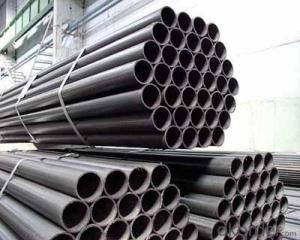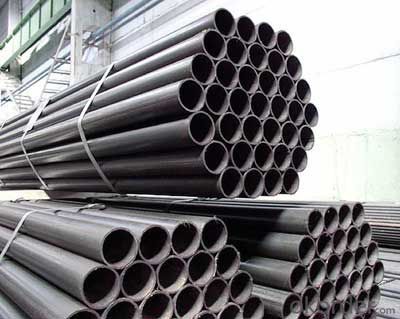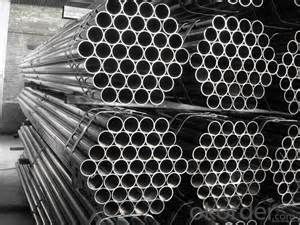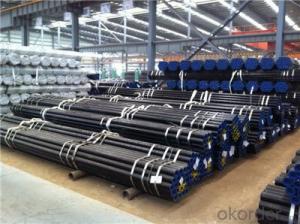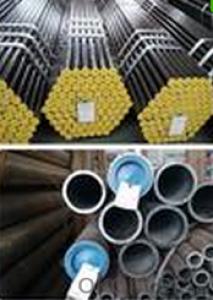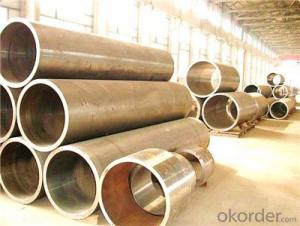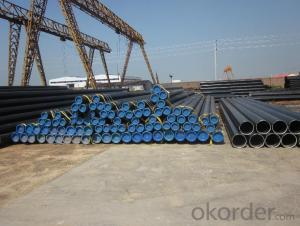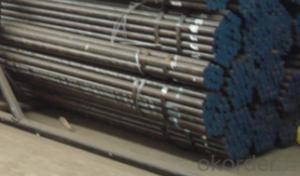Seamless Carbon Steel Pipe with High Quality and Best Price CNBM
- Loading Port:
- Tianjin
- Payment Terms:
- TT or LC
- Min Order Qty:
- 25 m.t.
- Supply Capability:
- 10000 m.t./month
OKorder Service Pledge
OKorder Financial Service
You Might Also Like
1、Structure of Seamless Carbon Steel Pipe with High Quality and Best Price CNBM:
Seamless pipe is formed by drawing a solid billet over a piercing rod to create the hollow shell. As the manufacturing process does not include any welding, seamless pipes are perceived to be stronger and more reliable. Historically seamless pipe was regarded as withstanding pressure better than other types, and was often more easily available than welded pipe.
2、Main Features of the Seamless Carbon Steel Pipe with High Quality and Best Price CNBM:
• High manufacturing accuracy
• High strength
• Small inertia resistance
• Strong heat dissipation ability
• Good visual effect
• Reasonable price
3、Seamless Carbon Steel Pipe with High Quality and Best Price CNBM Specification:
Standard | GB, DIN, ASTM ASTM A106-2006, ASTM A53-2007 |
Grade | 10#-45#, 16Mn 10#, 20#, 45#, 16Mn |
Thickness | 8 - 33 mm |
Section Shape | Round |
Outer Diameter | 133 - 219 mm |
Place of Origin | Shandong, China (Mainland) |
Secondary Or Not | Non-secondary |
Application | Hydraulic Pipe |
Technique | Cold Drawn |
Certification | API |
Surface Treatment | factory state or painted black |
Special Pipe | API Pipe |
Alloy Or Not | Non-alloy |
Length | 5-12M |
Outer Diameter | 21.3-610mm |
Grade | 20#, 45#, Q345, API J55, API K55, API L80, API N80, API P110, A53B |
Standard | ASME, ASTM |
1) Material:20#(ASTM A 106/A53 GRB.API5LGRB,GB),45#,16Mn,10#.
2) Specification range:OD:21.3-610mm,WT:6-70mm,length:6-12m or according to the requirement of clients.
3) Excutive standards:GB,ASME API5L.ASTM A 106/A53,Despite of the above standards,we can also supply seamless steel pipe with standard of DIN,JIS,and so on,and also develop new products according to the requirements of our clients!
4) Surface:black lacquered,varnish coating or galvanized.
5) Ends:Beveled or square cut,plastic capped,painted.
6) Packing:bundles wrapped with strong steel strip,seaworthy packing.
4、Packaging & Delivery
Packaging Details: | seaworthy package,bundles wrapped with strong steel strip |
Delivery Detail: | 15-30days after received 30%TT |
5、FAQ of Seamless Carbon Steel Pipe with High Quality and Best Price CNBM:
①How is the quality of your products?
Our products are manufactured strictly according to national and internaional standard, and we take a test
on every pipe before delivered out. If you want see our quality certifications and all kinds of testing report, please just ask us for it.
Guaranteed: If products’ quality don’t accord to discription as we give or the promise before you place order, we promise 100% refund.
②How about price?
Yes, we are factory and be able to give you lowest price below market one, and we have a policy that “ for saving time and absolutely honest business attitude, we quote as lowest as possible for any customer, and discount can be given according to quantity”,if you like bargain and factory price is not low enough as you think, just don’t waste your time.Please trust the quotation we would give you, it is professional one.
③Why should you chose us?
Chose happens because of quality, then price, We can give you both.Additionally, we can also offer professional products inquiry, products knowledge train(for agents), smooth goods delivery, exellent customer solution proposals.Our service formula: good quality+good price+good service=customer’s trust
SGS test is available, customer inspection before shipping is welcome, third party inspection is no problem.
6、Seamless Carbon Steel Pipe with High Quality and Best Price CNBM Images:
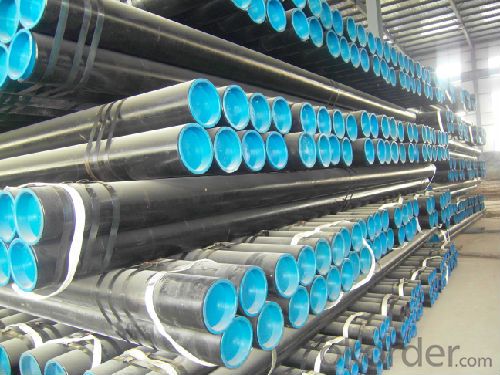
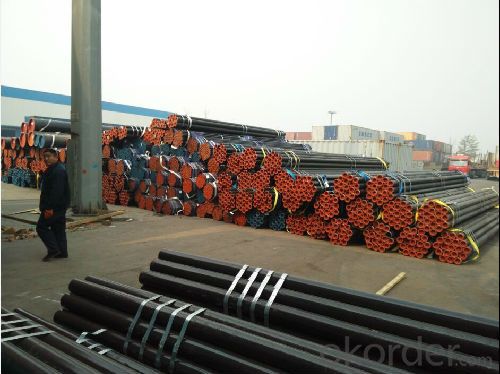
- Q: What are the different types of steel coatings used for pipes?
- There are several types of steel coatings used for pipes, including epoxy, polyethylene, polypropylene, and fusion bonded epoxy (FBE) coatings. Each of these coatings provides different levels of corrosion resistance and protection, making them suitable for various applications and environmental conditions.
- Q: How to calculate the maximum bending stress of steel pipe? Is there a list of the maximum flexural normal stresses for steel pipes of different materials and diameters?
- Wnx - net sectional modulus of steel tubes, also called net sectional resistance moment. If the section is not weakened, it can be found in the steel sheet of the steel structure design manual. If the section is weakened, it can be calculated by the formula according to the sectional dimension according to the formula of the material mechanics.
- Q: Can steel pipes be used for solar power systems?
- Yes, steel pipes can be used for solar power systems. Steel pipes are commonly used for various applications in solar power systems, including the construction of support structures, mounting systems, and piping systems for circulating heat transfer fluids. Steel pipes are preferred due to their strength, durability, and resistance to environmental conditions. They can handle the weight of solar panels, support structures, and withstand the forces exerted by wind and other external factors. Additionally, steel pipes can be easily customized and welded to meet specific project requirements. Overall, steel pipes are a reliable and cost-effective choice for solar power systems.
- Q: What are the factors affecting the cost of steel pipes?
- The factors affecting the cost of steel pipes include raw material prices, production and manufacturing costs, transportation and logistics expenses, market demand and supply dynamics, import and export tariffs, government regulations, and the overall economic conditions. Additionally, factors such as the grade and quality of steel used, diameter and thickness of the pipes, and any additional features or coatings can also influence the cost.
- Q: Can steel pipes be used for aboveground applications?
- Yes, steel pipes can be used for aboveground applications. They are commonly used in various aboveground structures such as buildings, bridges, and pipelines due to their strength, durability, and resistance to environmental conditions.
- Q: What is the weight of hot galvanized steel tubes? DN150 4mm wall thickness
- DN150 4mm wall thickness welded steel pipe theoretical weight is 16.21kg/m, galvanized steel pipe should be multiplied by the weight coefficient after galvanizing, C, DN150, wall thickness of 4mm, C=1.032, DN150, theoretical weight and wall thickness of 4mm galvanized steel is 1.02*16.21=16.7287kg/m = 16.73kg/m.
- Q: What are the main components of a steel pipe?
- The main components of a steel pipe are the pipe body, which is made of steel and provides structural strength and durability, and the pipe ends, which can be either threaded or plain and are used for connecting and joining the pipe to other components or systems. Additionally, steel pipes may also have protective coatings or linings to enhance corrosion resistance and prolong their lifespan.
- Q: How do steel pipes differ from other types of pipes?
- Steel pipes differ from other types of pipes in a few key ways. Firstly, steel pipes are known for their strength and durability. They have a high resistance to heat, pressure, and corrosion, making them suitable for a wide range of applications. This strength also allows steel pipes to withstand heavy loads and provide a long service life. Another distinguishing feature of steel pipes is their versatility. Steel pipes can be manufactured in various shapes and sizes to meet specific project requirements. This adaptability makes them a popular choice for a wide range of industries, including construction, oil and gas, water treatment, and manufacturing. Steel pipes also offer excellent thermal conductivity, meaning they can efficiently transfer heat from one area to another. This makes them suitable for applications such as heating and cooling systems, as well as for transporting hot fluids or gases. Furthermore, steel pipes are known for their resistance to fire. They have a high melting point and do not easily catch fire or contribute to the spread of flames. This property is crucial in applications where fire safety is a concern, such as in buildings or industrial facilities. Lastly, compared to other types of pipes, steel pipes have a higher initial cost. However, their long-term benefits, such as their durability and low maintenance requirements, often outweigh the initial investment. Steel pipes are also highly recyclable, making them an environmentally friendly choice. In summary, steel pipes stand out from other types of pipes due to their strength, durability, versatility, excellent thermal conductivity, fire resistance, and recyclability. These qualities make steel pipes a preferred option for a wide range of applications in various industries.
- Q: How are steel pipes used in the manufacturing of food and beverage processing plants?
- Steel pipes are commonly used in food and beverage processing plants for various purposes such as transporting liquids, gases, and steam. They are used to create a network of pipelines that facilitate the movement of raw materials, ingredients, and finished products throughout the manufacturing process. Steel pipes are chosen for their durability, corrosion resistance, and ability to withstand high pressure and temperature conditions, ensuring the safety and efficiency of food and beverage production.
- Q: What are the factors to consider when selecting a steel pipe for a specific application?
- When selecting a steel pipe for a specific application, several factors need to be considered. These include the type of fluid or gas being transported, the pressure and temperature conditions, the size and dimensions required, the desired corrosion resistance, and the overall budget for the project. It is also crucial to assess the pipe's material properties, such as its strength, ductility, and toughness, to ensure it can withstand the operational demands of the application. Additionally, factors like the pipe's manufacturing process, compatibility with joining methods, and any specific industry standards or regulations should be taken into account.
Send your message to us
Seamless Carbon Steel Pipe with High Quality and Best Price CNBM
- Loading Port:
- Tianjin
- Payment Terms:
- TT or LC
- Min Order Qty:
- 25 m.t.
- Supply Capability:
- 10000 m.t./month
OKorder Service Pledge
OKorder Financial Service
Similar products
Hot products
Hot Searches
Related keywords
